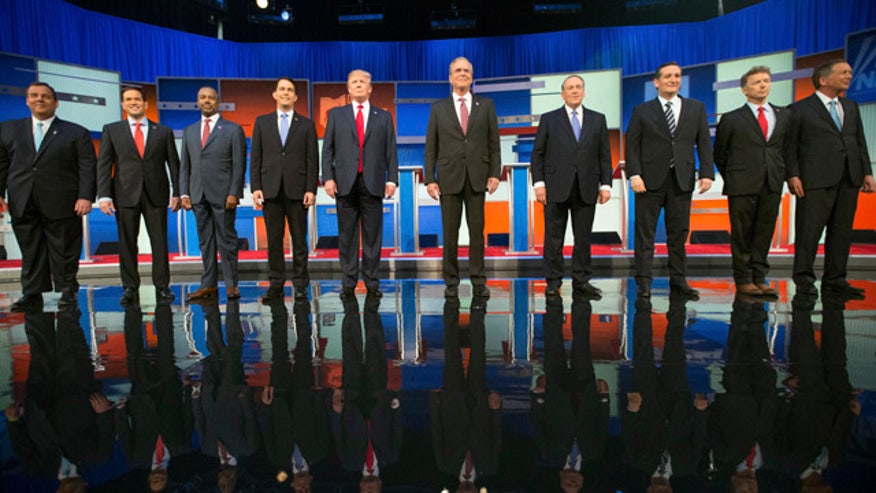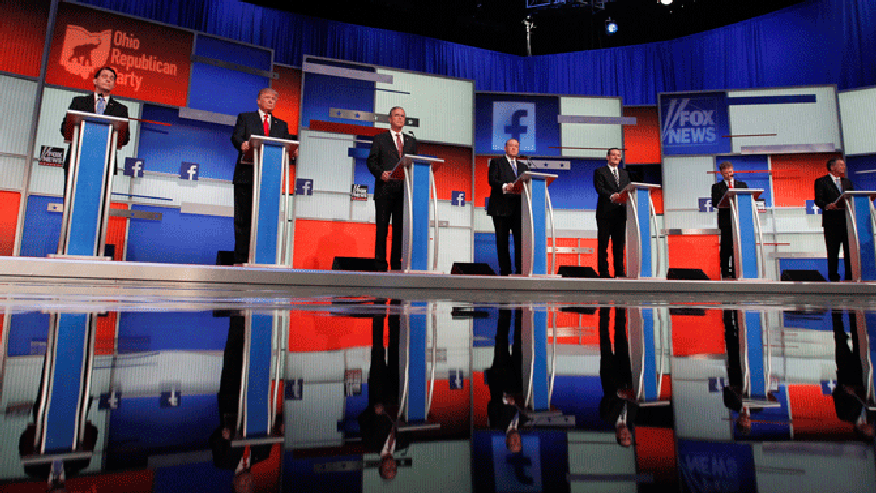It was clear to everyone in a windowless conference room in the basement of Cleveland’s Quicken Loans Arena that this would be the most incendiary question of the debate.
Megyn Kelly, flanked by Bret Baier on her right and Chris Wallace on her left, read to the assembled group of executives and producers the wording she had crafted.
Kelly said she would ask Donald Trump: "You’ve called women you don't like 'fat pigs', 'dogs', 'slobs'" and "disgusting animals", including on Twitter. Did he have the temperament to be president?
There was some discussion of whether another woman, Hillary Clinton, should be added to the question. Kelly wanted to keep the Twitter reference so people could go online and see for themselves what Trump had written over the years and that it wasn’t just about Rosie O’Donnell. She felt there was a good chance she would be booed by the audience—and that The Donald would hit back hard.
“If Trump comes after me, don’t jump in and save me,” Kelly told her co-moderators.
As it turned out, part of the audience tittered, Trump interrupted to say he was talking about Rosie, then said he was not politically correct and had always been nice to Megyn—but maybe he shouldn’t be anymore. He had parried a hard question with a series of thrusts.
Thursday night’s presidential debate was the product of a seemingly endless series of meetings involving Fox executives and the Baier-Kelly-Wallace team, which also handled the debates in 2011 and 2012. The arduous phrasing and honing of the questions was complicated by the time constraints imposed by having 10 candidates on stage.
For all the media chatter about Fox and the Republican Party, these sessions were driven by one goal: how to ask the candidates tough questions and pin them down. I saw the same meticulous process as a reporter at an Orlando debate in 2011, before I joined Fox News. The anchors barreled ahead, knowing full well that their aggressive approach in Cleveland would draw flak from some on the right.
The team spent considerable time on the wording of what would be the night’s first question: Would everyone on stage agree to endorse the winner of the Republican primaries? The discussion turned to whether that seemed like a Trump question.
“It is a Trump question,” Washington Managing Editor Bill Sammon said.
Baier would ask for a show of hands. What if Trump was the only one not to take the pledge? Then, the group decided, the “Special Report” anchor would ask a followup about how Trump could seek the GOP nod without ruling out a third-party bid. (Trump took the bait, raised his hand, and the debate made news in its opening moments.)
Wallace offered up a question for Jeb Bush, tying it to Hillary Clinton’s recent charge that he is part of the war on women. As the “Fox News Sunday” anchor described it, he would ask the former Florida governor about supporting a defunding of Planned Parenthood and his recent foot-in-mouth comment that $500 million might be too much to spend on women’s health.
Kelly also discussed a question about opposition to abortion for Wisconsin Gov. Scott Walker, who did not support making an exception if the mother’s life was at stake. Did that stance render him out of the mainstream?
With a number of hot-button issues slated for the top, there was concern in the room that some viewers, or candidates, might find that jarring. “We should forecast it, here we come with our hot stuff,” Baier suggested.
Baier tried out a question about Marco Rubio’s tax plan and whether it amounted to “trickle-down economics.” Sammon wondered whether the lengthy question could be streamlined.
Kelly's potential question for Ben Carson centered on his past misstatements, such as not knowing that the Baltic states were part of NATO. Was the surgeon too inexperienced to be president?
The thrust of these sessions was about how best to probe the candidates’ weaknesses, get them off their talking points and close off rhetorical escape routes.
But there were also mundane considerations, such as what sound would cut off the candidates after 60 seconds—a basketball buzzer was considered and rejected--and how many questions and answers, divided into what the team called “buckets,” could be squeezed in before each set of commercials. One such break would last nearly four minutes and, a staffer explained, give the 10 candidates a chance to go to the bathroom.
Kelly relished the idea: “Men are finally going to be in the same position as women are with the bathrooms—all going to the same stall.”
Although the session waded deep into the nitty-gritty, everyone in the room was acutely aware of the stakes.
Michael Clemente, Fox’s executive vice president for news, told the gathering it was “breathtaking to see how much attention” the debate was drawing. “I think it’s going to be as big as LeBron going back to Cleveland,” he said.
By yesterday afternoon, there was more banter and kibitzing to break the tension, especially on what were seen as difficult questions. Kelly said she planned to ask Ohio Gov. John Kasich about expanding Medicaid in his state by saying St. Peter at the pearly gates would ask what he did for the poor: “Why should people think you won’t use the St. Peter rationale to expand every government program?” That prompted a chorus of oooh’s.
Kelly, who famously asked Jeb Bush the question that tripped him up on the Iraq war, now planned to ask him about the families of those killed in action: “How do you now look at them and say your brother’s war was a mistake?” Another strong reaction.
Baier was torn between asking Trump one of two questions, either about his past support for single-payer health care and other liberal programs, or about his contributions to Democratic lawmakers. The room was divided as well. (He wound up asking both.)
Some of the back-and-forth turned on math. Trump and Bush were each down for seven questions, and Marco Rubio for six after a “hanging chad” recount, but Ted Cruz would have two rebuttals. Were they being careful enough in splitting up the time?
“I don’t want to be defending how some guy got shortchanged,” Sammon said.
He paused for a moment of reflection, telling the group: “I have one tiny tiny worry, in 1 percent of my brain, that it’ll be anticlimactic," that the anchors would have to "spur it along.”
An hour before airtime, Brit Hume, the Fox debate veteran who stopped by the windowless conference room, wondered if the moderators would ask about a Politico story quoting an unnamed donor as saying Bush had called Trump a "buffoon," "clown" and "asshole."
The consensus was to ask Bush if it was true, perhaps drawing a response from The Donald. But how to deal with the language issue?
"You say A-hole," Hume said.
"You can't say A-hole," Kelly responded. "You can't even say blank-hole."
The compromise was "a word that cannot be repeated on television."
On stage Bush denied the story, but called Trump’s rhetoric “divisive.” Trump, with a nod toward the moderators, said “I don’t think they like me very much.” It was anything but dull.
"These are really good questions," tweeted Jeff Greenfield, the former ABC and CNN correspondent. "The moderators have done their homework, thought through what they want to zero in on."




 The Democrats
The Democrats









 Brian Stelter
Brian Stelter













